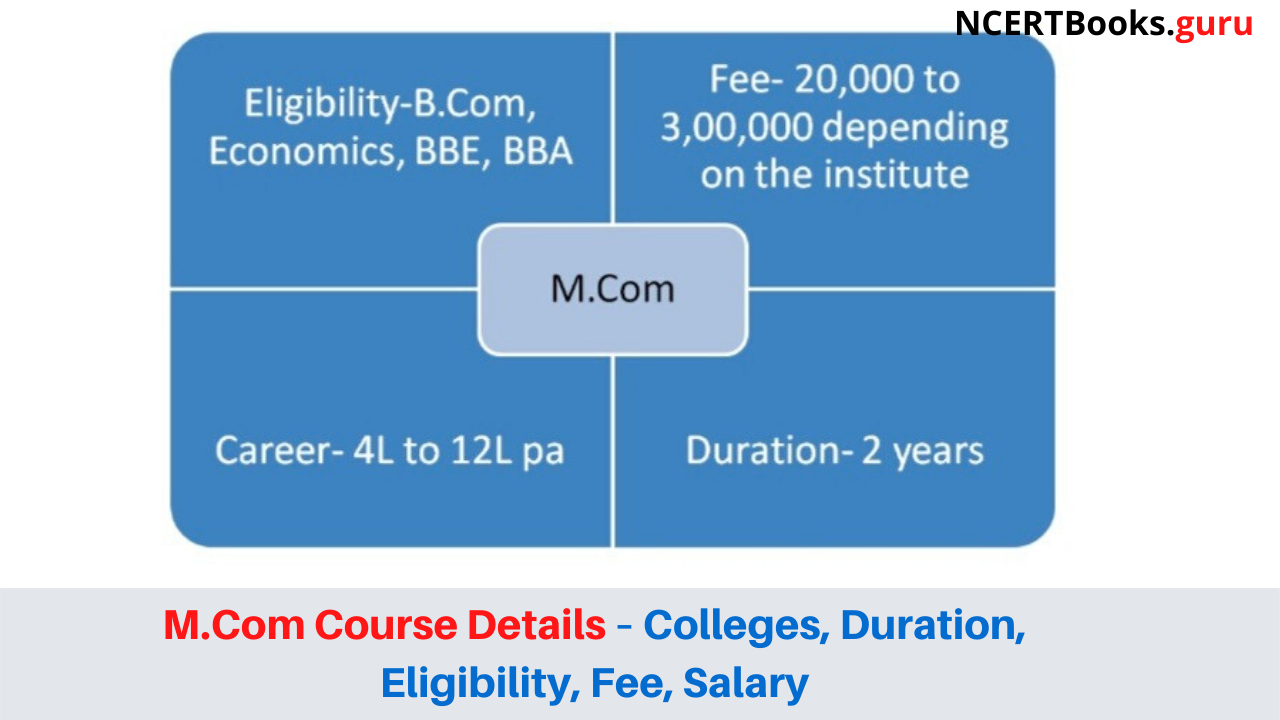M.Com Course Details: An increasing number of students are opting for the commerce stream to pursue their career in, which is not surprising at all, given the need for commerce graduates in the industry. The demand for commerce education has increased manifold over the years, especially after the dot-com bubble and the 2008 Lehman Crisis.
The curriculum and pedagogy have improved considerably for both B.Com and M.Com to nurture students in accordance with the demands and needs of the industry. Commerce graduates are required across all industries and hence their job stability is industry independent. Besides, it’s well known that every business, every governmental and non-governmental organization in it, needs these critical functions and competencies possessed by commerce graduates, and hence there is no dearth of job opportunities in the market.
M.Com Full Form – “Master of Commerce”
In this article, let us see the basics of M.Com, its eligibility criteria, Admission Process, Course Duration, fee structure, and most importantly, why taking up M.Com in India is good for your career.
- Why should you study M.Com?
- M.Com Entrance Exams | How to get into M.Com?
- Eligibility Criteria for M.Com
- M.Com Admissions
- Fee Structure for M.Com
- Master of Commerce Course Duration
- M.Com Specializations
- Colleges list offering M.Com in India | Where to study M.Com?
- Some of the most sought after commerce colleges in India are
- M.Com Course Details
- Master of Commerce Subjects
- M.Com Course Syllabus
- Job Opportunities after M.Com
- Scope after M.Com
- Salary/Earnings offered to M.Com Candidates
- What is the fees for M.Com?
- What is the full form of M.Com?
- Is M.Com better than MBA?
- What is the average salary of an M.Com Graduate?
What is M.Com?
With the advent of technology and globalization, managing the financials and economic aspects of organizations has become the primary focus in every country. And this focus can be fulfilled by someone who is well versed in accounting and financial knowledge. And this is where your degree in M.Com comes in handy.
A master of commerce is 2 years full-time post engineering degree. It is university-level education that acts as a gateway for students to jump into their professional careers after having successfully completed their degree in bachelor on commerce. Once you have completed B.Com Course, M.Com can be done in the specialization of your choice and desires. A degree from reputed colleges like Delhi University or JNU (Jawaharlal Nehru University) can pave a long way ahead in the field and provide you with a strong career. List of Commerce Courses in India details is here.
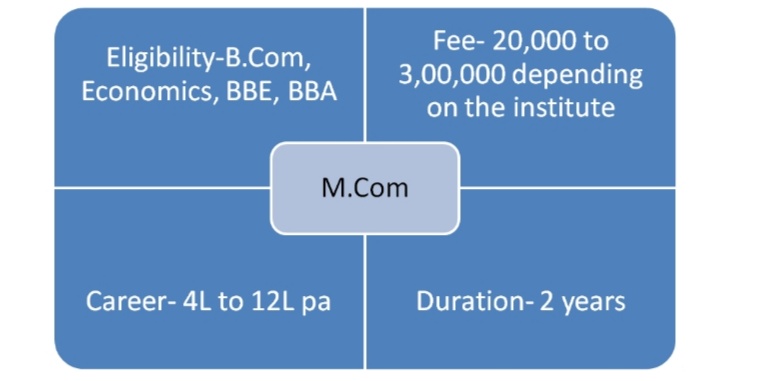
The career growth in an M.Com course is highly robust and dynamic in nature because here you will studying the subject of your choice and the ones that will actually help in your profession in the later stages of your career
- Starting salary depends on the stream opted for and the college is chosen.
- Fees vary according to affiliations and the management of the institutions.
- A degree in master in commerce can hone the entrepreneurial skills of the students. Every year 5% to 10% of students graduating from top schools opt out of the placements in order to start their own firm. Many students pursue their Ph.D. in their stream of specialization. Since research and development in financial engineering, corporate finance, and economics are given priority by different governments across the world, a Ph.D. will also help you make a dent in the world.
Why should you study M.Com?
Good job opportunities, a bright career, and a good pay scale across industries are the reason behind this trend. And this trend is a blessing that is done right so by students and institutions, given the timely inventions and innovations happening around the world coming from organizations and the institutes that nurture them.
Here are the reasons a degree in M.Com is important for your career:
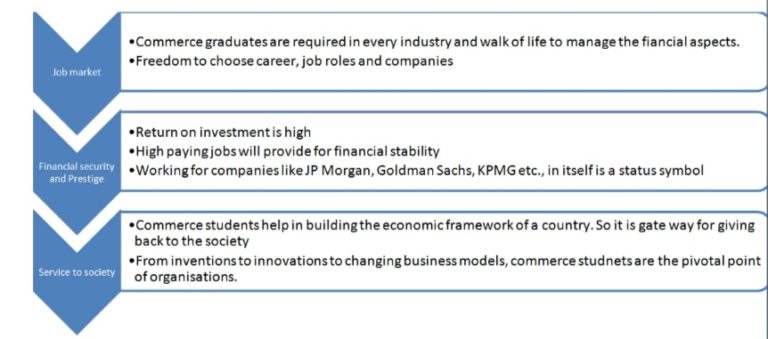
M.Com Entrance Exams | How to get into M.Com?
The only thing you need, in order to get into a good commerce college, is hard work and passion. Everything else, including training, books, study materials, entrance exams, etc., is all just to get where you want to.
Many colleges admit students if they fulfil the eligibility criterion. But to get into top colleges, there might be entrance examinations.
The various exams across India to pursue M.Com are, which are popular and of significance to students:
- CUCET- Central University Common Entrance Test
- AUCET – Andhra University Common Entrance Test
- OUCET – Osmania University Common Entrance Test
- Mohammad Ali Jauhar University Entrance Exam
- State university entrance examination
- Examinations conducted by private universities
More than an examination, cut-off marks matter to get into a top college for your M.Com dream.
But how do you get into a good commerce college?
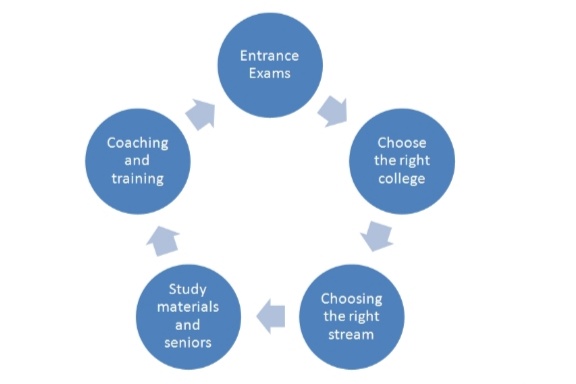
From choosing the right college to opting for the stream of your interest and preparing well for the exams, all the help you need is available right here, right now.
Eligibility Criteria for M.Com
The basic eligibility criteria required for M.Com are candidates is to have graduation in Commerce Stream. As an alternative, you can even do honours in economics or business/management studies. Most of the universities require 45-50% marks in order to give Admission into M.Com.
Also, Check
M.Com Admissions
M.Com Colleges offer Admission to Candidates based on the merit list. Candidates will be shortlisted if they meet the eligibility criteria set by the concerned college or university. Most colleges offer a merit-based admission whereas Few colleges conduct a university level entrance exam too.
Fee Structure for M.Com
The average M.Com Course Fees for a Candidate lies in between 20,000 – 3 Lakhs Per Annum depending on the institute. The fee usually varies based on the prestige of the institute, faculty provided, placement facility, and also on the management/ government quota.
Master of Commerce Course Duration
Master of Commerce is a 2 Year Post-Graduate Course that helps aspirants to analyze the subjects related to commerce. It is a specialized course that trains the individual for a career in the finance and corporate sector. CHeck Best Commerce Courses After 12th here.
M.Com Specializations
A commerce degree in the right field and the right college according to your needs and aptitude can provide you with a bright and successful future ahead. And on top of this, a masters’ degree in commerce specialization will take you places in your career that you would have always dreamt of.
Master of Commerce is a course that has many specializations. Aspirants can go with the following specializations during their M.Com Course List and they are as follows
- Accounting
- Finance
- Marketing
- Human Resources Management
- Taxation
- International Business
- Entrepreneurship
- Business Analytics
- Corporate Law
- Industrial Business
- Operations Management
- Management Accounting
Colleges list offering M.Com in India | Where to study M.Com?
Every year, more than 1 lakh students sit for various commerce stream examinations across the country. There are enough M.Com seats for most of them. But doing M.Com is different from doing M.Com from the right college. We will help you choose the right college, but before that let us break some myths about commerce colleges, shall we?
- If you don’t do M.Com from top schools, then it is not worth it- Not necessarily. DU or JNU or SRCC might be the most sought after institutes in India, but it’s in no way a tool to measure your career success. It all depends on you and only you whereas institutes can just open the gate for your career. But then again, it does not mean you shouldn’t aim for these institutes, they are at the top because they deserve to be there.
- Cracking the cut-off is next to impossible- It is impossible only if you believe it is impossible. An M.Com course is a post-graduate program. It’s not ungodly to crack the cut-off rates. With proper guidance and efforts, anybody can crack the criteria and get into college.
- A job is guaranteed if I Do M.Com- Nothing is guaranteed unless your competencies are honed. Even Du or JNU does not guarantee any job for anybody. Again, it all depends on you.
Some of the most sought after commerce colleges in India are
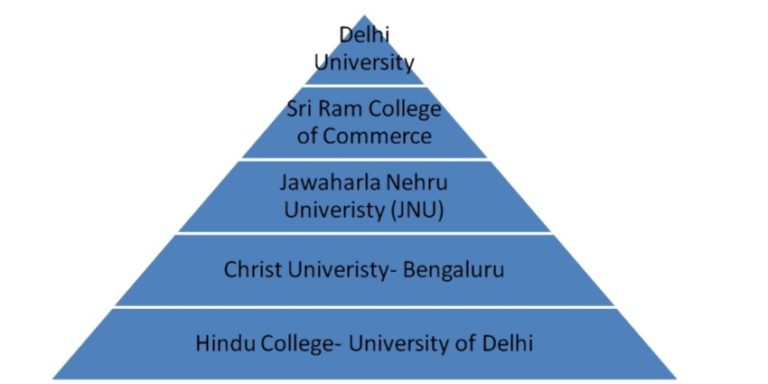
SRCC is considered to be the topmost prestigious institute to study commerce and economics in the country. There are various other public universities like Delhi University, JNU, and Anna University which are also the most sought institutes in the country. Many private run institutes like Christ University and St. Joseph’s college of commerce are the frontrunners when it comes to student choices.
M.Com College List is included here:
- Lady Sriram College, New Delhi
- St. Joseph’s College of Commerce, Bangalore
- Christ University, Bangalore
- Loyola College, Chennai
- St. Xavier’s College, Kolkata
- Anil Surendra Modi School of Commerce, Mumbai
- Symbiosis College of Arts & Commerce, Pune
- St. Joseph’s College of Commerce, Bangalore
- Hans Raj College, Delhi University
- Madras Christian College, Chennai
M.Com Course Details
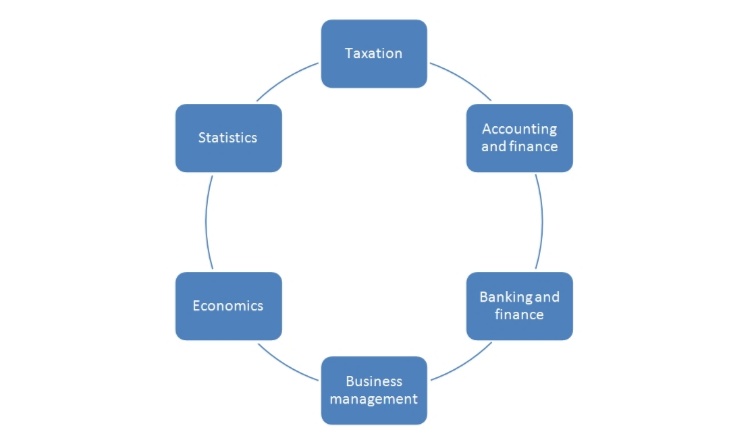
Each of these courses consists of the following subjects:
Taxation
- Accounting theory
- Advanced corporate accounting
- Financial management
- Indirect taxation: Central and state taxes
- Service tax
- Strategic marketing management
- E-Commerce
- Advanced financial and cost accounting
- International business environment
Electronics
- Accounting for business decisions
- Applied cost accounting
- Cost control techniques and theories
- Enterprise resource planning
- Investment and portfolio management
- Management accounting
- Modern banking
- Insurance and risk management
- Quantitative techniques for finance
- Security analysis and portfolio management
Banking and finance
- Investment management, banking law, and practice
- Marketing of financial services
- Modern banking theory, law, and practice
- Quantitative techniques for financial management
- Research methodology
- Commercial Bank Management
- Business policy and strategic management
- Foreign exchange markets and forex management
- International banking and finance
Business management
- Negotiations and conflict management
- Organizational behaviour and leadership
- Human resource management
- Current issues in global business
- Knowledge and information systems
- Managerial economics and economic theories for business decisions
- Global virtual enterprise
- Global strategic management
- Fundamental theories of project management
Economics
- Advanced Econometrics
- Time Series and Business Forecasting
- Game Theory and Application
- Marketing Research
- Urban Transport Economics
- Corporate Finance
- Portfolio Management
- Energy Economics
- Agriculture Economics
- Financial Risk Management
- Ecosystem Services and Ecological Economics
- Labour economics
Statistics
- Actuarial science,
- Applied information economics,
- Biostatistics,
- Business statistics,
- Data analysis,
- Demography,
- Econometrics,
- Energy statistics,
- Engineering statistics,
- Psychological statistics,
- Social statistics
Master of Commerce Subjects
Have a glance at the M.Com Course Subjects as per the Latest Curriculum and have beforehand knowledge. It will be easy for you during the time of preparation as you be familiar with the concepts to cover.
- Accounting for Managerial Decisions
- Business Environment
- Computer Applications in Business
- Computer Financial Accounting
- Corporate Legal Environment
- Corporate Tax Planning
- E-Commerce
- Economics of Global Trade and Finance
- Financial Management
- Management Concepts and Organisation Behaviour
- Managerial Economics
- Marketing Management
- Statistical Analysis
- Strategic Management
- Banking & Finance
- Commercial Bank Management
- Entrepreneurial Management
- Financial Bank Management
- Financial Markets
- Human Resource Management
- International Finance
- Investment Management
- Research Methodology in Commerce
- Financial Institutions and Markets
- Project Planning
- Control Security Analysis
- Portfolio Management
- Advertising and Sales Management
- Consumer Behaviour
- Marketing Research
- Foreign Trade Policy
- International Business Environment
- International Marketing
- Statistics
M.Com Course Syllabus
We tried mentioning the Syllabus for M.Com Course as per the Latest Curriculum followed in a majority of the colleges. You might observe minor deviations in the Syllabus followed in certain colleges. However, the core part remains the same. Candidates can also get M.Com Books details which are helpful to score better marks in the course.
| S. No. | Subjects of Study |
|---|---|
| Compulsory Papers | |
| 1 | Accounting for Managerial Decisions |
| 2 | Business Environment |
| 3 | Computer Applications in Business |
| 4 | Corporate Financial Accounting |
| 5 | Corporate Legal Environment |
| 6 | Corporate Tax Planning |
| 7 | E-Commerce |
| 8 | Economics of Global Trade and Finance |
| 9 | Financial Management |
| 10 | Management Concepts and Organization Behaviour |
| 11 | Managerial Economics |
| 12 | Marketing Management |
| 13 | Statistical Analysis |
| 14 | Strategic Management |
| Optional Papers | |
| 1 | Banking & Finance |
| 2 | Commercial Bank Management |
| 3 | Entrepreneurial Management |
| 4 | Financial Bank Management |
| 5 | Financial Markets |
| 6 | Human Resource Management |
| 7 | International Finance |
| 8 | Investment Management |
| 9 | Research Methodology in Commerce |
Apart from the subjects listed above, candidates need to pick at least a group from the following
| S.No | Group Name | Group Subjects |
|---|---|---|
| 1 | Accounting and Finance | Accounting for Managerial Decision, Advanced Financial Accounting, Corporate Financial Accounting, Financial Institutions and Markets, Project Planning, Control Security Analysis, Portfolio Management |
| 2 | Marketing | Advertising and Sales Management, Consumer Behaviour and Marketing Research |
| 3 | International Marketing | Foreign Trade Policy, Procedures and Documentation, International Business Environment, International Marketing |
| 4 | Statistics | – |
Job Opportunities after M.Com
M.Com Graduates will have lucrative career options in a variety of areas and the employment scope is such
- Investments Analyst
- Accounts Assistant
- Investment Banker
- Assistant Accountant
- Market Analyst
- Accountant
- Marketing Manager
- Business Analyst
- Money Manager
- Cashier/Teller
- Operations Manager
- Corporate Analyst
- Personal Finance Consultant
- Executive Assistant
- Risk Analyst
- Finance Manager
- Securities Analyst
- Financial Analyst
Scope after M.Com
Some of the most prestigious organizations to work for after completing your degree are
- KPMG
- JP Morgan
- Barclays
- Wells Fargo
- Reliance
- Tata
- Reserve Bank of India
- Securities and Exchange Board of India
If you aspire to give it back to society and work for government organizations, you need to clear certain government examinations conducted by UPSC (Union Public Service Commission) to work with various Public Sector Units and governmental bodies like:
- RBI- Reserve Bank of India
- FMC- Forward Market Commission
- SEBI- Securities and Exchange Board of India
- Planning commission
- PFRDA – Pension Fund Regulatory and Development Authority
- IRDA- Insurance regulatory and development authority
- BSNL- Barat Sanchar Nigam Limited
- IOL- Indian Oil Limited
- SBI- State Bank of India
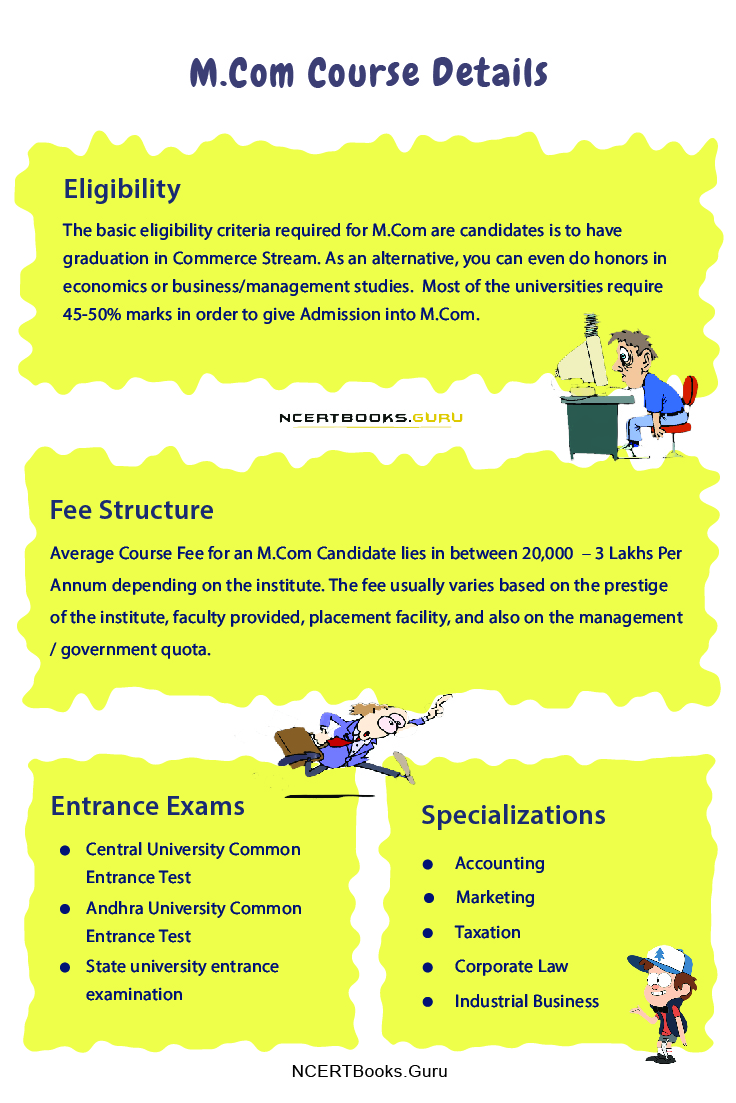
Salary/Earnings offered to M.Com Candidates
Graduates will get an average Salary of 4 Lakhs Per Annum initially. Salary varies from firm to firm and based on the sector in which you are working. Once, you gain enough expertise and skillset, and based on the diligence of the individual salary will not be the constraint. You can demand more if you have the right skills.
FAQs on M.Com Course Details
1. What is the fees for M.Com?
Average fees for M.Com Course is in between 20,000 – 3 Lakhs Per Annum. This varies based on the institute, faculty, placements history and on several factors.
2. What is the full form of M.Com?
M.Com stands for Master of Commerce and is a post-graduate degree in Commerce Stream.
Both are one and the same and accepted by the majority of the firms. MBA is for those who wish to establish their career in Business Management and Administration Field. M.Com is for those who have an interest in the Finance Sector.
Final Words
We wish the info shared above regarding M. Com Course Details has been beneficial in clarifying your queries to the fullest. If you have any other queries feel free to leave us a comment and our team of experts will guide you at the earliest. Stay tuned to our site for the latest updates regarding Books, Syllabus, Course Details, Study Materials, etc.
